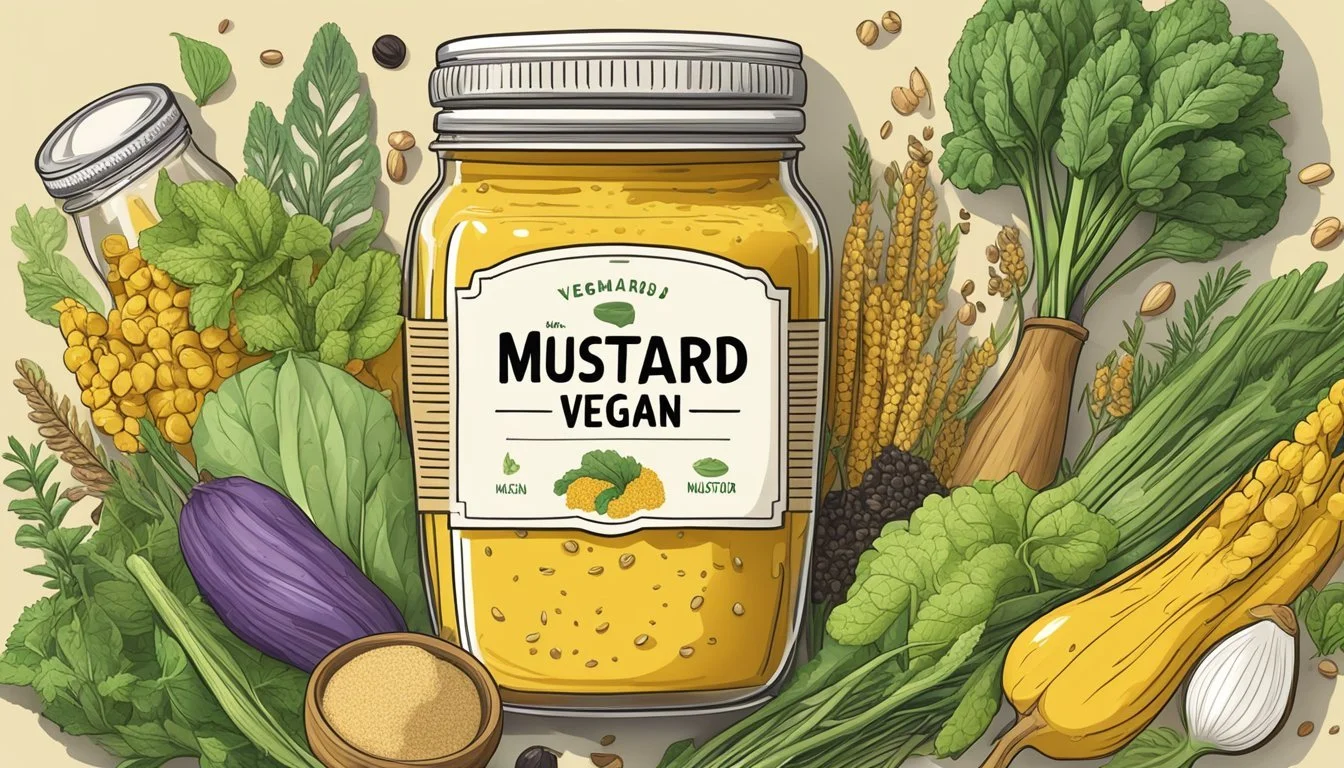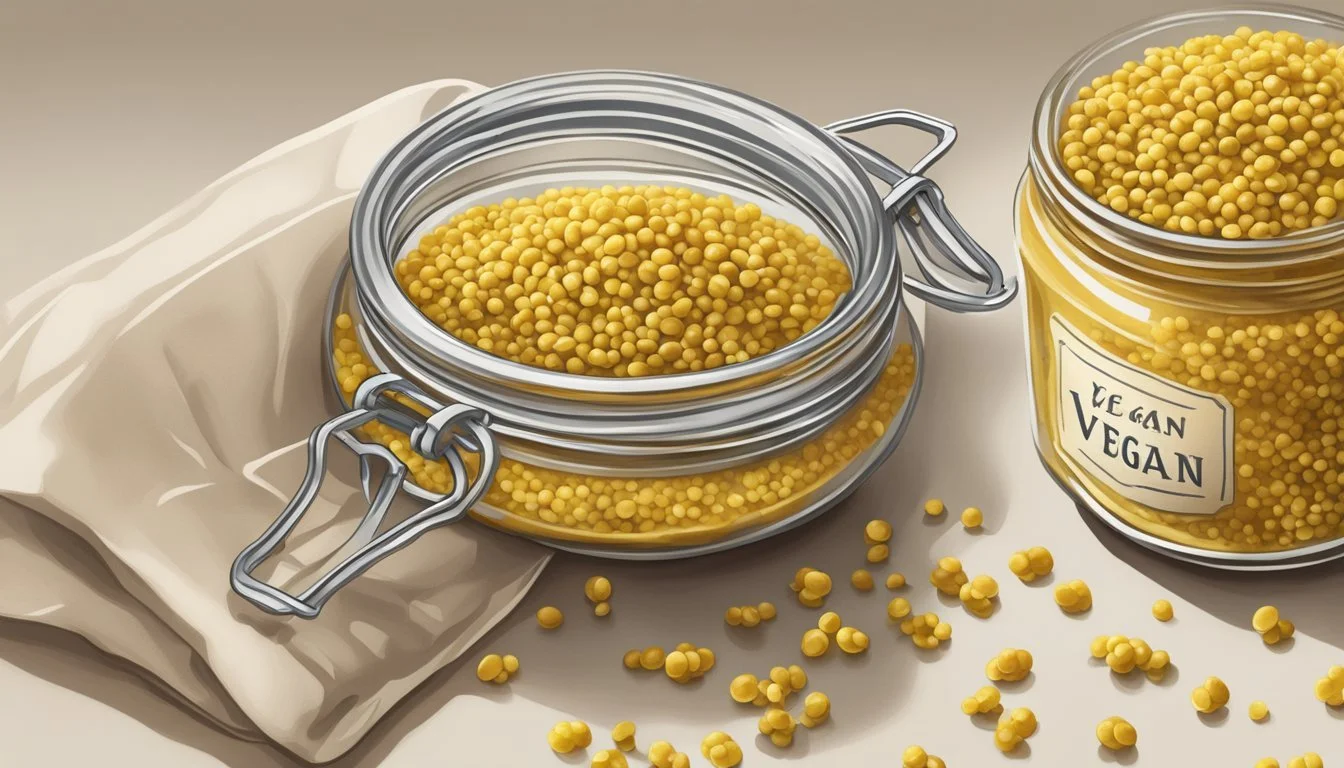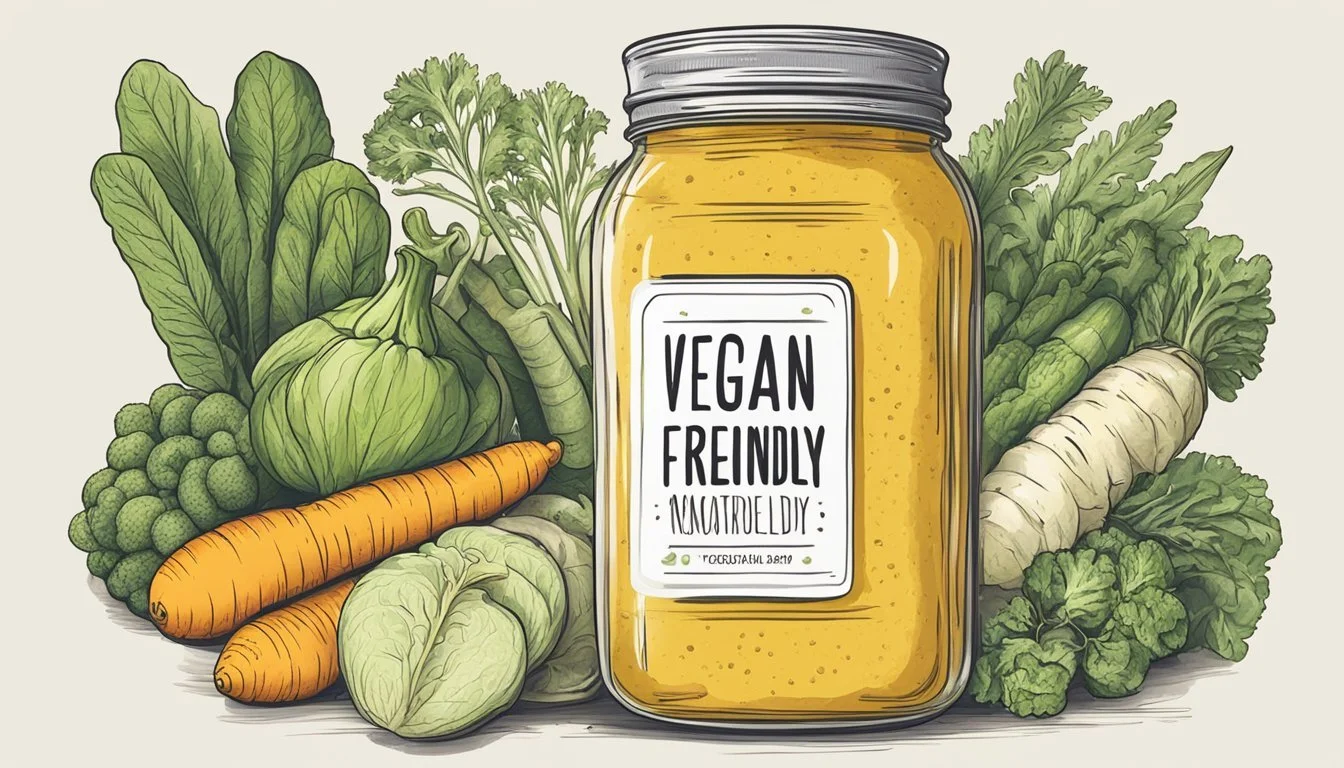Is Mustard Vegan?
Unveiling The Truth About Your Favorite Condiment
Mustard is a condiment derived from the seeds of the mustard plant, a member of the Brassicaceae family. In its simplest form, mustard typically includes seeds, water, vinegar, and occasionally spices and flavorings. Given these ingredients, mustard is generally suitable for a vegan diet, which excludes animal products. The base ingredients are plant-based; however, vegans should be aware of additional ingredients that may not adhere to vegan standards, such as honey or other additives found in certain mustard varieties.
Different types of mustard, such as Dijon, yellow, whole grain, spicy brown, and even more exotic blends, offer a range of flavors from tangy to intensely hot. Store-bought mustards usually comply with vegan criteria, but it's still prudent for consumers to examine labels for non-vegan ingredients, especially in gourmet or specialty mustards. For those inclined to culinary endeavors, homemade mustard can be easily made vegan by controlling the ingredients to ensure they align with vegan values, avoiding any animal-derived components.
The appeal of mustard extends beyond taste to its low-calorie profile, making it an attractive option for those on a vegan diet looking for flavor without compromise. As mustard is primarily made of seeds and simple ingredients, it is not only a vegan-friendly option but also a versatile and health-conscious choice for enhancing a variety of dishes.
Understanding Mustard
In this section, readers will gain insights into the different varieties of mustard, their key components, the process of how mustard is produced, and its historical significance.
Mustard Varieties
Mustard comes in numerous varieties, each possessing a unique flavor profile and appearance. The most common types are yellow mustard, known for its bright color and mild taste, primarily made from white mustard seeds. Dijon mustard, originating from France, offers a sharper, tangier flavor due to the use of brown mustard seeds and white wine. Brown mustard, often used in Indian cooking, has a spicy, robust flavor. Specialty mustards like honey mustard combine mustard with honey for a sweet and tangy sauce.
Key Ingredients in Mustard
The basic ingredients in mustard include mustard seeds, vinegar, water, and salt. Mustard seeds are the primary component, with variations in color and taste. Vinegar acts as a preservative and adds acidity, while additional spices and flavorings, such as turmeric or paprika in yellow mustard, create the distinct flavors of each type.
Mustard Production Process
The production of mustard involves several steps. First, the selected mustard seeds are ground into powder. Depending on the variety, different liquids, such as water, vinegar, or wine, are then mixed with the powder to form a paste. Additional ingredients like spices may be incorporated at this stage. The mixture is then allowed to age to develop its flavors before being bottled as the final condiment.
Historical Context of Mustard
Mustard is one of the oldest known condiments, dating back to ancient civilizations. It was a popular culinary and medicinal ingredient in ancient Rome and Greece. Over the centuries, the use of mustard spread across Europe, with each region adapting the recipe to local tastes and available ingredients, thus leading to the creation of distinct mustard varieties such as Dijon in France.
Veganism and Food Choices
In the context of veganism, food choices are critically influenced by the need to avoid animal products. This section explores what defines a vegan diet, highlights common non-vegan ingredients, and outlines the process of evaluating the vegan suitability of food products.
Defining Veganism
Veganism is a dietary and lifestyle choice where individuals exclude all forms of animal cruelty and exploitation. From a dietary perspective, a vegan diet consists exclusively of plant-based foods, such as vegetables, fruits, grains, nuts, and seeds, and eliminates all animal-based products, including meat, dairy, eggs, and honey.
Common Non-Vegan Ingredients
When assessing food products for vegan suitability, it is crucial to identify common non-vegan ingredients that may not be instantly recognizable. Here are a few to be aware of:
Casein: A milk protein found in some "non-dairy" products.
Gelatin: Derived from animal connective tissue, often used as a gelling agent.
Lactose: A sugar from milk that may appear in processed foods.
Honey: Often debated, but generally not considered vegan as it is produced by bees.
Evaluating Food Products for Vegan Suitability
To determine if a food product is vegan-friendly, one must scrutinize the ingredient list and manufacturing processes for the presence of animal products. A product is vegan-friendly if it meets the following conditions:
No animal products: It contains no meat, dairy, eggs, or other animal-derived ingredients.
Cross-contamination: Ideally, it should also be free from cross-contamination with animal products during production.
Label reading becomes an essential skill, and looking for certifications such as "Certified Vegan" can provide additional assurance.
Mustard Ingredients and Vegan Concerns
When examining whether mustard is vegan-friendly, it's important to consider the typical components as well as specific ingredients that may raise concerns for vegans.
Common Mustard Ingredients
Mustard typically consists of:
Seeds: Mustard seeds are the essential base of any mustard.
Liquids: Vinegar, water, or lemon juice provide acidity.
Flavorings: Salt, sugar, and various spices enhance flavor.
Acid Lovers: The acidic environment of mustard due to ingredients like vinegar or lemon juice is inhospitable to bacteria, contributing to its shelf life.
Non-Vegan Ingredients
Some varieties of mustard may include non-vegan ingredients:
Sweeteners: Honey, used in honey mustard, is an animal product.
Thickeners or Clarifiers: Gelatin, isinglass, or casein may be used, though rarely.
Wine and Mustard
Dijon mustard is known for its use of wine:
Wine: White wines, sometimes including those clarified with animal products like isinglass, can be a concern.
Wine Alternatives: Apple cider vinegar or water can be used as alternatives to wine, making mustard vegan-friendly.
Honey in Mustard
Honey mustard is an exception:
Honey: Its inclusion in honey mustard makes this variety non-vegan.
Mustard Brands and Vegan Varieties
When considering mustard options, it's important for vegans to identify brands that offer vegan-friendly varieties and to become adept at label reading to ensure they are choosing condiments free of animal-derived ingredients.
Recognizing Vegan Mustard Brands
Vegan consumers should look for brands that explicitly label their mustards as vegan. Many conventional mustard brands offer vegan yellow mustard; however, certain speciality mustards like Dijon may contain non-vegan ingredients. Well-known brands like Grey Poupon are recognized for Dijon mustard, which traditionally isn't vegan due to the inclusion of white wine. Nonetheless, some brands now offer vegan Dijon mustard alternatives specifically formulated without any animal byproducts.
Label Reading Tips
Understanding ingredient lists is crucial for vegans. Labels can sometimes be deceptive, with non-vegan ingredients hiding behind unfamiliar names. When reading labels, vegans should be wary of the following non-vegan ingredients that may appear in some mustard varieties:
Honey – commonly found in honey mustard
Eggs – might be present in creamy mustards or mayonnaises
Wine – often an ingredient in traditional Dijon mustard recipes
Popular Vegan Mustard Options
Vegans have a plethora of choices when it comes to mustard. Here's a list of common mustard types that are typically vegan:
Yellow mustard: Usually made with simple ingredients like mustard seeds, vinegar, water, and spices.
Vegan Dijon mustard: Specialty vegan brands produce Dijon mustard without animal products, offering the same tangy flavour without compromising on ethics.
Vegan-Friendly Mustard Types Common Ingredients Notable Vegan Brands Yellow Mustard Mustard seeds, vinegar Generic store brands, Heinz Vegan Dijon Mustard Mustard seeds, vinegar Annie's Naturals, 365 Everyday Value
Most vegan mustards will be clearly labelled, simplifying the selection process for consumers. By paying close attention to the ingredient list and choosing known vegan brands, one can enjoy the robust flavours of various mustards without straying from a vegan diet.
Mustard in Vegan Cooking
Mustard, a versatile and flavorful condiment, is derived from mustard seeds and is a staple in vegan cooking. It offers both spice and tanginess to dishes without the use of animal products making it a beloved ingredient among vegans for its ease of use in enhancing a variety of recipes.
Vegan Condiment Alternatives
In the realm of vegan condiments, mustard is a prime option due to its simple, plant-based ingredients. Commercial mustard typically contains mustard seeds, vinegar, water, and spices, all of which are vegan-friendly. Not only is it suitable as a direct condiment, but mustard also serves as a base for creating other vegan sauces and dips. For instance, vegan honey mustard can be made by combining mustard with vegan honey substitutes such as agave nectar.
To diversify the vegan condiment repertoire, one might blend mustard with:
Vegan mayo to create a creamy spread for sandwiches
Maple syrup for a sweet and tangy salad dressing
Soy sauce and garlic for an Asian-inspired marinade
Here is a simple table of mix-ins to create various mustard-based vegan condiments:
Mix-in Ingredient Mustard Type Resulting Condiment Vegan Mayo Yellow/Dijon Mustard Creamy Mustard Spread Maple Syrup Whole Grain Mustard Sweet Mustard Dressing Soy Sauce & Garlic Spicy Brown Mustard Asian Marinade
Incorporating Mustard into Vegan Recipes
Mustard excels as an ingredient within vegan recipes, both for its taste and its ability to bind ingredients. Its inclusion can elevate the flavor profile of vegan dishes. One can drizzle mustard over roasted vegetables (What wine goes well with roasted vegetables?) for added zest, or whisk it into a vinaigrette to dress fresh salads. Mustard also mixes well into marinades that give tofu and tempeh a savory punch.
A few specific ideas for incorporating mustard into vegan recipes include:
Dips: Blend mustard with vegan sour cream or hummus for a flavorful vegetable dip.
Salads: Emulsify mustard into balsamic vinegarettes for robust salads.
Tofu: Marinate tofu with mustard and herbs before baking or grilling for enhanced flavor.
Grains: Stir mustard through cooked quinoa or rice along with herbs for a spicy kick.
Here are some examples for using mustard in vegan dishes:
Sandwich Spread: Swap out traditional mayonnaise for mustard in sandwiches and wraps.
Tofu Scramble: Add mustard to a tofu scramble for depth of flavor, mimicking the taste complexity of eggs.
Glazes: Use mustard as a glaze for vegan proteins or roasted vegetables before baking.
Through its utility as a condiment and recipe ingredient, mustard plays an integral role in the crafting of delightful, satisfying vegan dishes.
Additional Considerations
When exploring the suitability of mustard for various diets and preferences, it's important to consider potential allergens and dietary limitations as well as the environmental and ethical footprints of the product.
Allergies and Dietary Restrictions
Mustard Allergies: Some individuals may have an allergy to mustard seeds, which constitutes a primary ingredient in mustard. This allergen should be clearly listed on labels, and those with allergies ought to avoid mustard products entirely.
Gluten-Free Needs: Mustard is naturally gluten-free; however, cross-contamination can occur if it is processed in a facility that also handles wheat or other gluten-containing products. For those with celiac disease or gluten sensitivity, certification of gluten-free mustard is vital.
Organic Options: Consumers seeking a healthier lifestyle might prefer organic mustard, which ensures that the mustard seeds haven't been treated with synthetic pesticides.
Bone Char-Free Sugar: Although uncommon, some mustards can contain sugar, which could be refined with bone char. Individuals seeking a vegan lifestyle should ensure sugars used in flavored mustards, like sweet mustards, do not involve bone char.
Environmental and Ethical Considerations
Environmental Impact: The production of mustard can vary in its environmental impact. Mustard made from organically farmed seeds, without synthetic fertilizers or pesticides, can be considered a choice aligned with an environmentally conscious lifestyle.
Vegan Ethics: Aside from basic mustard, variations like honey mustard are not vegan due to the inclusion of honey, which involves the exploitation of bees. Vegans seeking to maintain an ethical diet should opt for mustards that avoid honey and any other animal-derived additives.
Calorie Content: Mustard is typically low in calories, making it a suitable addition for those monitoring their calorie intake. However, some condiments labeled as mustard, especially flavored or creamy ones, can contain higher calories and added fats.
A table summarizing key considerations:
Aspect Consideration Allergies Mustard can be an allergen. Look for allergen-free labels. Gluten Choose certified gluten-free mustard to avoid cross-contamination. Organic Organic mustard avoids synthetic pesticides. Healthy & Low-Calorie Plain mustards are low-calorie; watch for high-calorie varieties. Environmental Impact Organic farming practices reduce environmental impact. Ethical Choices Avoid honey and bone char-based sugars in mustard.
Consumers should carefully evaluate labels and may need to reach out to manufacturers directly to determine a product's suitability for their specific dietary restrictions and ethical values.
Conclusion
Mustard, in its basic form, is typically vegan. It is crafted from simple, plant-based ingredients:
Mustard seeds
Vinegar
Salt
Water
These components are of natural origin and do not involve animal products or byproducts.
However, when it comes to store-bought mustard varieties, consumers should be aware of variants containing non-vegan ingredients such as honey, as found in honey mustard. Some mustards may also include:
Wine or cream (in certain gourmet or specialty mustards)
Natural flavors or colorings (which could potentially have animal-derived sources)
For those maintaining a strict vegan diet, it’s advisable to:
Read labels carefully.
Look for certified vegan labels.
Be cautious of potential cross-contamination, which may be a concern for individuals with severe restrictions.
With a multitude of mustard options available, it is possible to find or prepare vegan-friendly versions that add flavor and richness to meals while honoring vegan principles.








